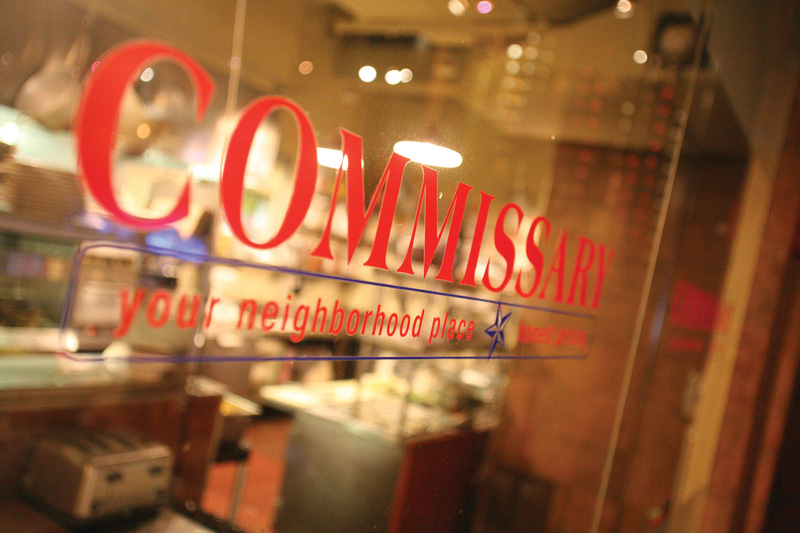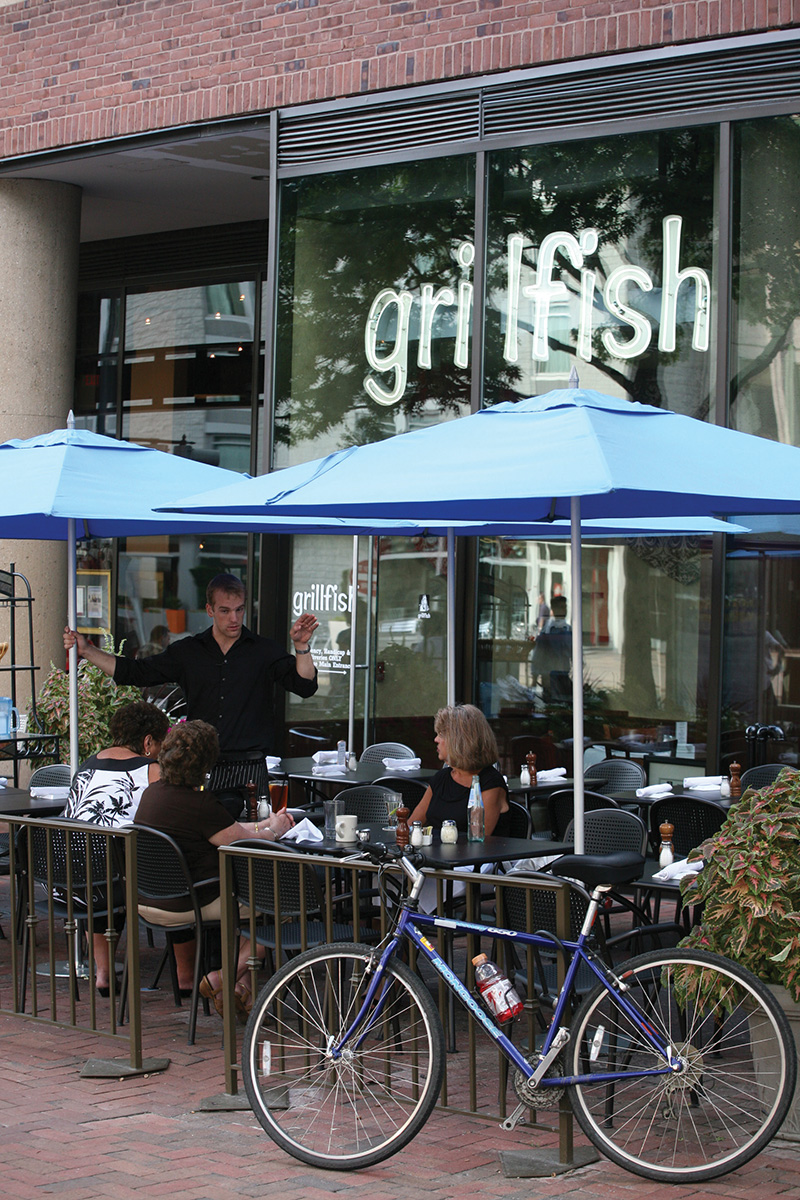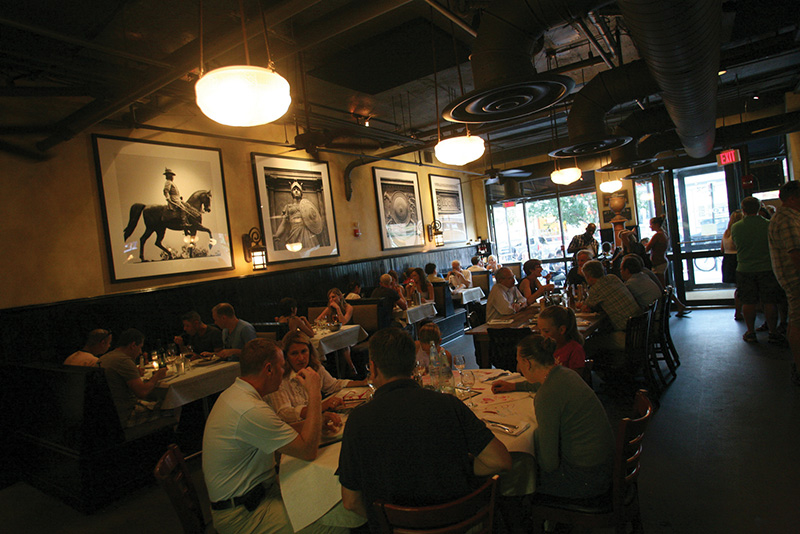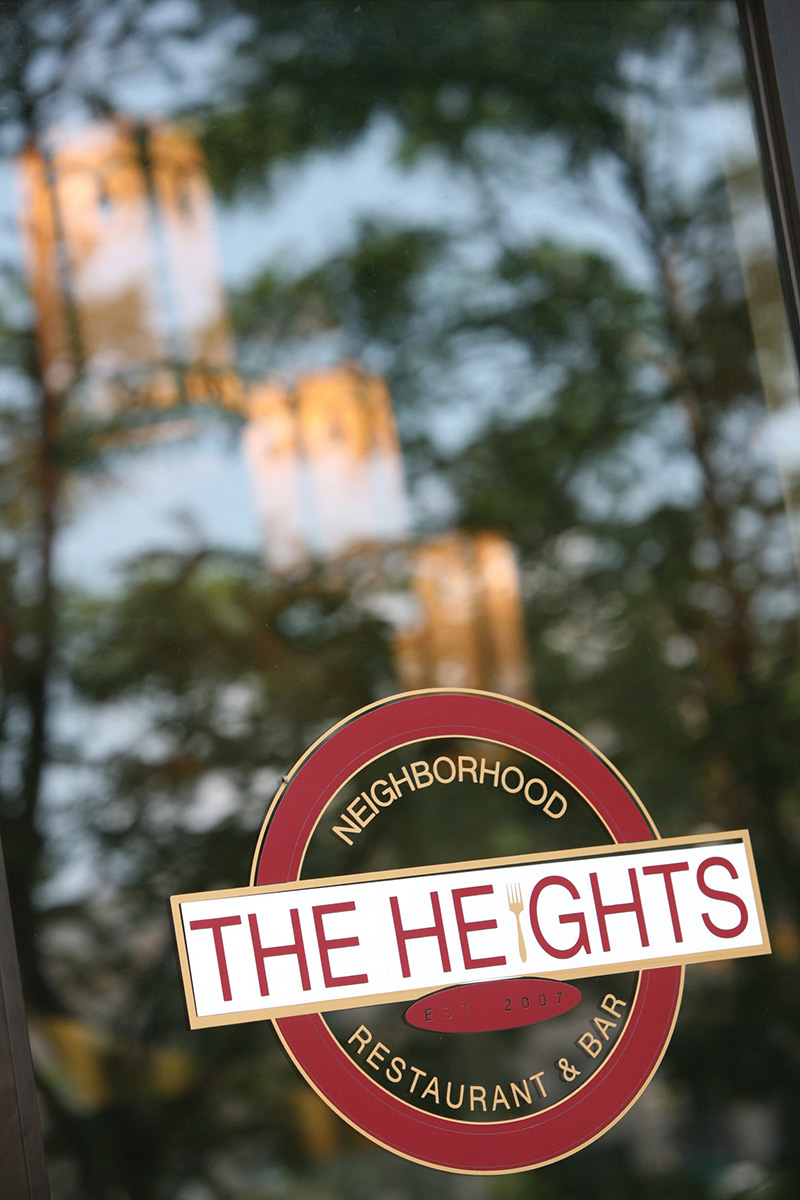How one small restaurant company, EatWell DC, can teach an industry about sustainable operations.
 By Josh Hahn
By Josh Hahn
EatWell DC operates five casual neighborhood restaurants in Washington, D.C., and employs more than 180 people. David Winer, Antonio Oquendo and I established EatWell DC in 2003 with the opening of Logan Tavern; then we followed with two more restaurants in the Logan Circle neighborhood: Commissary and The Pig, which features pork-centric cuisine. EatWell DC also operates The Heights, serving the Columbia Heights neighborhood, and Grillfish, a seafood-focused eatery near Dupont Circle.
 With more than 65 years of experience in restaurant management between us, my partners and I share a commitment to people and the planet. We’re in business to make a profit, but we do it with our people and the planet in mind. We care deeply about our many loyal guests and we care equally about our team. As our family of restaurants has evolved, we have learned that ethical, local, natural and sustainable practices are better for us all. The philosophy that quality of life and profitability go hand-in-hand permeates all five of our restaurants, which focus on approachable, diverse menu offerings, simple ingredients, friendly servers and partnerships with vendors who share our eco-friendly business model. Many of the tactics we have pursued are achievable by almost any business, or individual for that matter.
With more than 65 years of experience in restaurant management between us, my partners and I share a commitment to people and the planet. We’re in business to make a profit, but we do it with our people and the planet in mind. We care deeply about our many loyal guests and we care equally about our team. As our family of restaurants has evolved, we have learned that ethical, local, natural and sustainable practices are better for us all. The philosophy that quality of life and profitability go hand-in-hand permeates all five of our restaurants, which focus on approachable, diverse menu offerings, simple ingredients, friendly servers and partnerships with vendors who share our eco-friendly business model. Many of the tactics we have pursued are achievable by almost any business, or individual for that matter.
For restaurant operators who want to incorporate green practices into their business model, our advice is to start small. Think outside of the box, beyond purely sustainable food sourcing. While sustainable and local food sourcing is a main ingredient in the recipe for success of our restaurants, there are a number of ways you can extend those efforts in your restaurant’s operation, maintenance and construction, for instance.
 Choose one aspect of your operation to focus on, be it water usage, green energy, packaging or where you think you can have the biggest impact. We tried not to pressure ourselves to be “green” in everything, right away. It’s been a journey. We have certainly not come as far as we would like, and we certainly don’t do everything we should, but we like to think we do more than most, and we definitely have come further than we expected. One initiative has prompted another. It’s been a very forward-moving process.
Choose one aspect of your operation to focus on, be it water usage, green energy, packaging or where you think you can have the biggest impact. We tried not to pressure ourselves to be “green” in everything, right away. It’s been a journey. We have certainly not come as far as we would like, and we certainly don’t do everything we should, but we like to think we do more than most, and we definitely have come further than we expected. One initiative has prompted another. It’s been a very forward-moving process.
Eco-Conscious Operations
Contracting environmentally-focused vendors to help green our supply chain is a strategic move to extend our green business practices. It’s also been a two-way street. At times our vendors have changed their practices or brought in products at our request. Other times they have come to us to because they know we are looking for eco-friendly sources. As an example, one of our vendors — Dempsey Uniform & Linen Supply, a local, independent restaurant linen service — operates the first TRSA “Clean Green” certified laundering facility in the United States. They supply all of EatWell DC’s restaurants with mats, linens, napkins, aprons and bar towels; all washed, dried and finished with techniques selected to maximize sustainability, meeting strict standards for conserving resources, controlling sewer discharges and minimizing environmental impact. Our “green” paper products are from Maryland-based Acme Paper & Supply Company, Inc. using recycled or recyclable materials; packaging is made from sugar cane and there is a firm “no styrofoam” policy at all five restaurants. Green cleaning supplies are sourced from Auto-Chlor, recognized by the EPA for use of environmentally safe ingredients.
 On the maintenance side of operations, we look for products that conserve. Our dishwasher service and supply company was instrumental in changing our kitchen sprayers to low flow faucets, and we repeated that in our bathroom sinks and toilet facilities. We have Energy-Star rated appliances, and energy-efficient lighting is gradually replacing traditional lights. This year we expect to replace all halogen bulbs, incandescent and CFLs with LEDs. Highly concentrated cleaning chemicals reduce shipping costs and are delivered in recyclable packaging, and we set our ceiling fans to run in both directions to reduce the need for running the HVAC system for heating and cooling. We use all compostable to-go packaging, reusable plastic crates and sacks for delivering vegetables from our farm to our restaurant, and shut off all unnecessary equipment at slower times. All of our restaurant equipment is on a preventative maintenance schedule, and we work with a specialized contractor as a proactive measure to keep everything running optimally.
On the maintenance side of operations, we look for products that conserve. Our dishwasher service and supply company was instrumental in changing our kitchen sprayers to low flow faucets, and we repeated that in our bathroom sinks and toilet facilities. We have Energy-Star rated appliances, and energy-efficient lighting is gradually replacing traditional lights. This year we expect to replace all halogen bulbs, incandescent and CFLs with LEDs. Highly concentrated cleaning chemicals reduce shipping costs and are delivered in recyclable packaging, and we set our ceiling fans to run in both directions to reduce the need for running the HVAC system for heating and cooling. We use all compostable to-go packaging, reusable plastic crates and sacks for delivering vegetables from our farm to our restaurant, and shut off all unnecessary equipment at slower times. All of our restaurant equipment is on a preventative maintenance schedule, and we work with a specialized contractor as a proactive measure to keep everything running optimally.
Repurposing salvaged building materials has also been a mission for us. We often buy used or reclaim odd materials for new uses. We have an old bed frame we use as a host stand, for instance. We also use demolished building materials as décor and move furniture from location to location to change up the look. We also recycle glass, plastic, aluminum and paper. In some locations we even recycle wine bottles as water bottles.
Farm-to-Table Sustainable
Two years ago we purchased a 14-acre farm we named EatWell Natural Farm in La Plata, Maryland. Following major reconstruction of several buildings, there is now a solar-powered farmhouse and three bee hives. Future plans include a greenhouse where vegetables will be started from seed. We are now entering our third growing season, and have 20,000 square feet under production. Our goal is to triple that by 2015. While the farm is not yet large enough to supply all of our produce needs, and it only operates seasonally, we have a good variety of vegetables under cultivation. Last year we put in a fruit orchard, berry bushes and mushrooms. All of our vegetables are raised in a completely natural manner; we use no chemical fertilizers, pesticides or herbicides. Our soil is naturally enriched with compost including manure and compostable materials from our restaurants.
 The farm continues to be an experiment for us in natural farming, sustainability and truly a field-to-fork operation. We don’t look at it as a profit center — it’s definitely not at this point. But having our own farm is good exposure for us; it’s more work and money out of our pockets, but we love the food we get, and the camaraderie it builds among our staff and restaurant patrons. We’re working on that awareness every day in response to the time, effort and money we’ve put into responsible epicurean and agricultural leadership.
The farm continues to be an experiment for us in natural farming, sustainability and truly a field-to-fork operation. We don’t look at it as a profit center — it’s definitely not at this point. But having our own farm is good exposure for us; it’s more work and money out of our pockets, but we love the food we get, and the camaraderie it builds among our staff and restaurant patrons. We’re working on that awareness every day in response to the time, effort and money we’ve put into responsible epicurean and agricultural leadership.
Green Certifications & Partnerships
In addition to promoting vegetarian-friendly and eco-friendly logos on our corporate and restaurant materials, we have pursued green certifications and memberships, including REAL Certified (Responsible Epicurean and Agricultural Leadership), a nutrition and sustainability best practices certification program established by the United States Healthful Food Council (USHFC). The REAL Index is the standard when it comes to recognizing restaurants that do right by their customers. In order to achieve REAL Certification, each restaurant undergoes an extensive, third-party certification process that includes menu analysis, on-site inspections and interviews, spot checks and recipe audits and sourcing and supply chain review. REAL certification signals to the public that the entire establishment — not just a few menu items — utilizes nutrition and sustainability best practices.
EatWell DC is also a member of the Green Power Partnership, a free, voluntary program of the U.S. Environmental Protection Agency (EPA) that assists organizations with procuring electricity generated from renewable resources and promoting their green power leadership. All five EatWell DC restaurants are 100% wind energy powered using green wind energy credits through our membership with Clean Currents. In some cases, we even produce an excess which is returned to the utility grid.
Good Choices
We believe utilizing alternative energy and any other sustainable choices is the right thing for our business, and for our environment. It’s our responsibility to help reduce our carbon footprint where we can. While making sustainable choices is no silver bullet of savings, that is not our major motivation. We do it because it’s the right thing to do; it’s a cause we believe in; it’s the food we want to serve. In some cases green practices may be slightly more expensive, but we find we are more conscious in our overall business operations. Our awareness for conservation is a priority — not leaving lights on, not letting water run, not overbuying fresh meats or vegetables to reduce waste.
As we’ve set sustainability goals for ourselves, it has spurred our vendors and suppliers to change their ways or product lines. At times, these changes are more costly for them and for us. However, over time, like anything, as more businesses move in a green direction, the supply will increase and the costs will come down. We believe there are short term costs associated with long term gains. You have to be willing to make that investment and understand it holds value for you in terms of market share in attracting and retaining customers that seek restaurants who share their values in pursuing the ideal of a better quality of life. It’s a choice we make; it’s about community and environment — and at the end of the day, that’s the payback.
— Josh Hahn is an operating partner for the restaurant management company, EatWell DC, which operates five neighborhood restaurants: Commissary, The Heights, Logan Tavern, Grillfish and The Pig.
